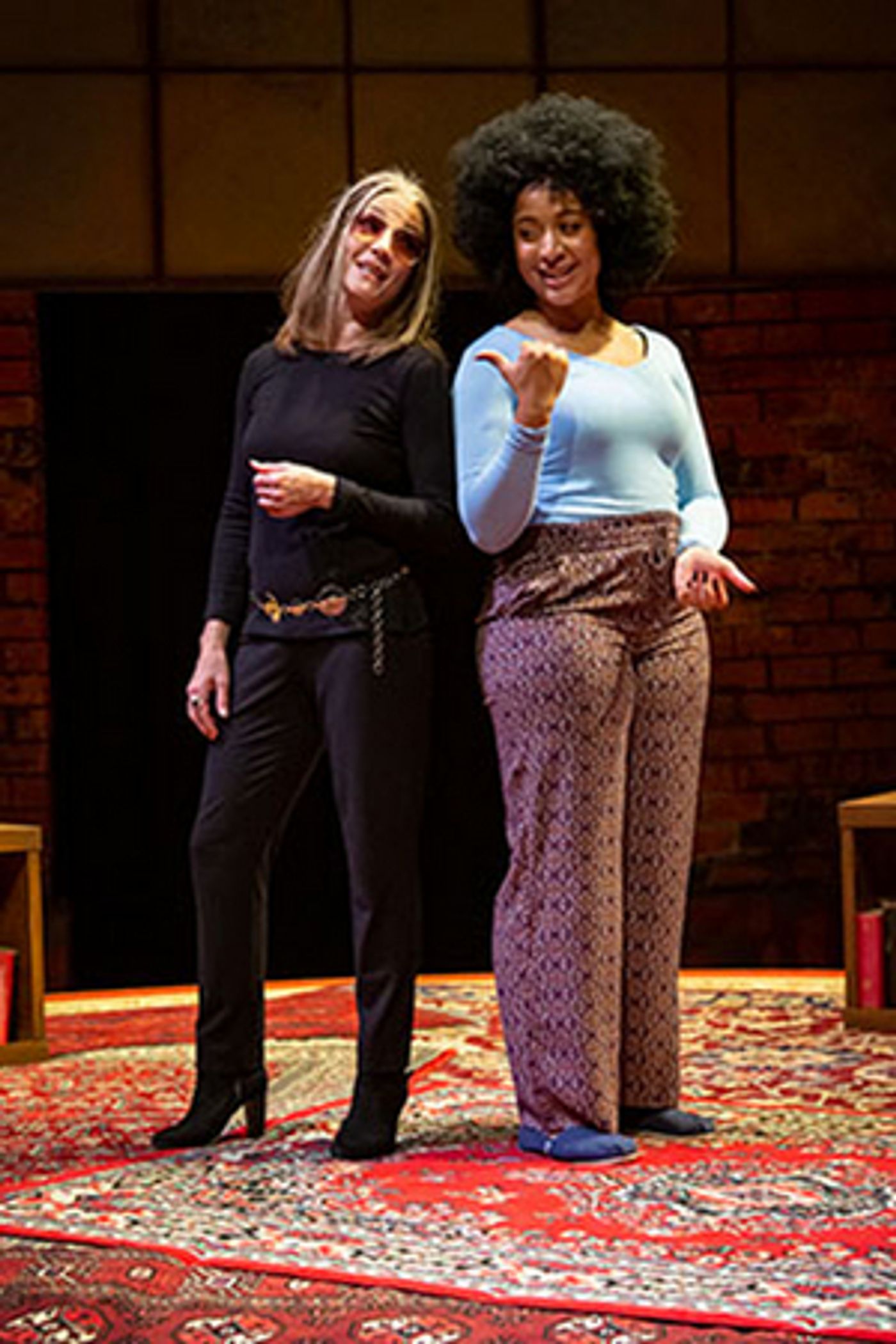Review: Regional Premiere of GLORIA: A LIFE at History Theatre
 Gloria Steinem turns 85 this year, and she's still working as a feminist activist. As embodied in this regional premiere by the great Charity Jones, she's as humble as she is savvy. This production dives into her long life, consistently dedicated to issues of women's rights, but full of personal evolution and discovery. Dozens of supporting roles are taken up by a strong ensemble of six additional women, dedicated to explicating Steinem's life in both the personal and public arenas. The play unrolls in brisk, forthright, direct address to the audience.
Gloria Steinem turns 85 this year, and she's still working as a feminist activist. As embodied in this regional premiere by the great Charity Jones, she's as humble as she is savvy. This production dives into her long life, consistently dedicated to issues of women's rights, but full of personal evolution and discovery. Dozens of supporting roles are taken up by a strong ensemble of six additional women, dedicated to explicating Steinem's life in both the personal and public arenas. The play unrolls in brisk, forthright, direct address to the audience.
Kaleidoscopic and largely chronological, this journey is backed by photographic and video projections of historical events and key people. Act 1 is just over an hour long. Act 2 is different every performance: it's a talking circle with the audience, featuring an invited guest who is a prominent Minnesota woman as the kickoff speaker, but then open to whatever reminiscences and resonances audience members care to share. After about 20 minutes of conversation, the cast draws the event to a close by sharing a challenge.
For 30 years, Playwright Emily Mann has been Artistic Director at the important McCarter Theater Center in Princeton, New Jersey. She's announced that she will step down from that position at the end of this season. Under her tenure, the McCarter won the Tony for Outstanding Regional Theater. As a playwright, she's among the foremost practitioners of documentary theater. Her scripts are firmly based in the historic record and endeavor to bring the audience into the actual lives, challenges, and achievements of people of our time, sometimes famous (as here) and sometimes less so (such as the Delany Sisters, in HAVING OUR SAY).
Mann has taken great care, as has Steinem in her autobiographical writing, to acknowledge how much she learned from women of color, including Dorothy Pitman Hughes, a civil rights activist and one of the co-founders of Ms. Magazine, and Wilma Mankiller, the first woman elected Principal Chief of the Cherokee Nation. The ensemble of actors that has been assembled by director Risa Brainin is quite diverse, in terms of ethnicity, age and body type. So are the invited guest speakers for the talking circle. The actors are, in alphabetical order: Katie Bradley, Lolly Foy, Cathleen Fuller, Jamila Joiner, Charity Jones, George Keller, and Dana Lee Thompson.
Video projections by Miko Simmons provide the most crucial visual contribution to this show. Beginning with quick visual references to vital history (the 1848 Women's Forum, Sojourner Truth, the suffragettes), the whirlwind history tour slows down a bit once we arrive at Steinem's formative years. We're shown common but egregious advertisements from the 1950's depicting subservient housewives, and we move all the way up to the near present, including the worldwide Women's March on January 21, 2017. Musical interludes are similarly chronological: preshow music includes "These Boots are Made for Walking" and the final song is by Lizzo. Sound design is by C. Andrew Mayer.
Joel Sass has devised a set with a large raised circle--a dais for a collective, not just a solo performer or a one-on-one interview--covered with an abundance of Persian carpets in warm reds. Backed by warm over-sized brick around the projection surface, the whole is topped by a large, open, bent wood canopy. The feel is gracious and welcoming. Amelia Cheever's costumes are practical everyday clothes, not fancy. Jones as Steinem wears black pants and long sleeved top, with a silver hip belt, as on the cover of her 2015 memoir My Life on the Road.
Unless you've read that book, you may not know that Steinem's upbringing was far from conventional. Her mother had a budding career in journalism but had a nervous breakdown before Gloria was born. Steinem's early years were spent traveling in a trailer while her dad pursued his career as a roaming antiques dealer. Once the family settled down, her parents were separated for most of the year, and Gloria became caretaker to her emotionally fragile mother. Her big dream as a child was to be a Rockette--with hindsight, she realizes that, for girls in the 1940s, entertainment was the ladder up and out that sports was for boys. The text skillfully weaves together outer events with growing psychological insight in a way that seems seamless and kept me more engaged than a more exclusive focus on either the public or the private would have done. The personal is political, after all.
The overall tone of the show is optimistic. Steinem is, as she tells us both at the beginning and the end of the performance, a "Hope-aholic." I could imagine this show providing a worthwhile multi-generational evening, one that might prompt both memories and questions, among people of all gender identities.
GLORIA: A LIFE runs through October 20 in Saint Paul.
Photo credit: Rick Spaulding
Reader Reviews
Videos

